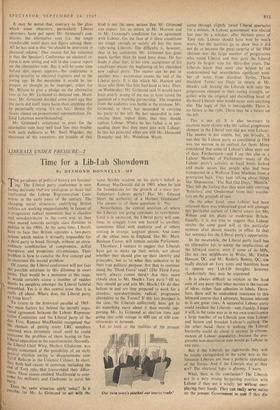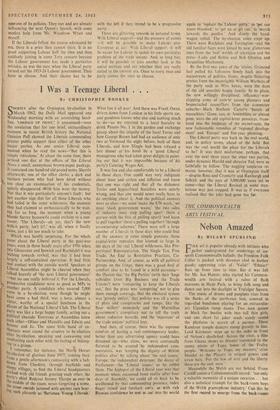LIBERALS UNDER PRESSURE-2
Time for a Lib-Lab Showdown
By DESMOND DONNELLY, NIP
rrliE paradoxes of political history are fascinat-
ing. The Liberal party conference is now facing decisions thar are analogous to those that confronted the Labour Representation Com- mittee in the early years of the century. The changing social structures underlying British Politics are working unquestionably in favour of a progressive radical movement that is classless and non-doctrinaire in the same way as they once moved towards outright class divisions in Politics in the 1900s. At the same time, Liberals have to face that Britain operates a two-party system which makes it virtually impossible for a third party to break through, without an extra- ordinary combination of compromise, skilful manceuvre and propitious circumstance. Their Problem is how to canalise the first concept and to overcome the second problem.
Of course, the Liberal conference will not face the possible solutions to this dilemma in overt terms. That would be a nonsense at this stage. It would certainly cause a number of sudden deaths by apoplexy amongst the Liberal faithful assembled. Yet it is this central issue that it is really all about. Where does the Liberal party ga from here?
To rzturn to the historical parallel of 1903: tW. o main factors lay behind the secretly nego- tiated agreement between the Labour Represen- tation Committee and the Liberal party of the Y. First, Ramsay MacDbnAld recognised that tile chances of getting many LRC members leturned were extremely small until he could ?yercome the problem of them having to face 'Liberal opposition In the constituencies. Secondly, 11,1e Liberal Chief Whip, Herbert Gladstone, was tleePlY concerned at the possibility of an early ..eneral election owing to disagreements over aral Reform in the Unionist Cabinet. In short, ettleY both had causes in common, including the end of Tory rule, that transcended their differ- _eoces. These causes enabled MacDonald to over-
me his militants and Gladstone to carry his Party.
bet. es the same situation apply today? Is it Possible for Mr. Jo Grimond to act with the
same flexible wisdom on his party's behalf as Ramsay MacDonald did in 1903. when he laid the foundations for the growth of a mass par- litithentary Labour party? Has Mr. Edward Shrift the authority of a Herbert Gladstone? The answer to all these questions is: No. • Nevertheless, the central question of where the Liberals are going continues to reverberate. Until it is answered, the Liberal party will con- tinue to struggle from one hazard to another, sometimes filled with euphoria and at others sinking in strange, stagnant gloom. And some of the ablest men in England, like Mr. Mark Bonham Carter, will remain outside Parliament.
Therefore. I venture to suggest that Liberals have got to make up their minds, not about whether they should give up their identity and principles, but as to what they conceive to be their true political purpose. Are they to continue along the 'Third Force' road? (The Third Force nearly always comes third.) Are they more closely akin to Mr. Heath's Tory party? (If so, they should go and join Mr. Heath.) Or do they believe in and are they prepared to work for a classless, non-doctrinaire, radical, progressive alternative to the Tories? If this last prospect is the case, the Liberals collectively have got to .do something more about it than merely sup- porting Mr. Jo Grimond at election time and going into cold storage in 600 out of 630 con- stituencies in between.
Let us look at the realities of the present
'Our twin town's pinched our tourist trade.'
scene through slightly tinted Liberal spectacles for a minute. A Labour government was elected last year by a whisker, after thirteen years of Tory rule. Labour should have won by much more, but the statistics go to show that it did not do so because the great surprise of the 1964 election was the large number of progressives who voted Liberal and thus gave the Liberal party its largest vote for thirty-five years. The Liberals know they were also helped by an undetermined but nevertheless significant num- ber of votes from dissident Tories. These dissident Tories are likely to return at Mr. Heath's call, leaving the Liberals with only the progressive element in their voting strength, to- gether with the original and dwindling band of die-hard Liberals who would never vote anything else. The logic of this is inescapable. There is no future to the right. There may be a future on the left.
This is not all. It is also necessary to examine more closely why the radical progressive element in the Liberal vote did not vote Labour.
The answer is not simple, but, put broadly, it was that the Labour party as constituted in 1964 was too narrow in its outlook for them. Many considered that some of Labour's ideas were out of date. Furthermore—and I say this also as a Labour Member of Parliament—many of the Labour party's activists at local levels looked and made noises like people who had been transported in a Wellsian Time Machine from a generation back. They kept talking about things like 'Depression,' The Bad Old Days,' Munich.'
They left the feeling that they were only omitting 'Balaclava' and 'Omdurman' from their vocabu- lary on the grounds of tact.
On the other hand, once Labour had been returned there was widespread good will amongst this particular section of Liberal voters for Mr.
Wilson and his plans to modernise Britain. Equally, it is not true to suggest that Labour retains the same good will at this particular
moment after eleven months in office. In that last sentence lies the liberal party's opportunity. In the meanwhile, the Liberal party itself has no alternative but to accept the implications of
the leftward course, even if some of its Nips, like my two neighbours in Wales, Mr. Emlyn Hooson, QC, and Mr. Roderic Bowen, QC, are really elected on Tory votes and therefore have to oppose any Lab-Lib thoughts, however clandestinely they may be expressed.
It is always difficult to explain to the hard core of any party that what matters is the success
of ideas, rather than adhesion to labels. There- fore, there will be undoubted resistance to this leftward course that I advocate, because inherent in it are great risks. A successful Labour party• could swallow the Liberals—and, frankly, I hope it will, in the same way as in my own constituency a large number of ex-Liberals now vote Labour and leaven and broaden Labour's outlook. On the other hand, there is nothing the Liberal hierarchy could do about it anyway in circum- stances of Labour popularity, because the pro- gressive non-doctrinaire vote would go Labour in any case.
But if the Liberals go rightwards they will be totally extinguished in the same way as the Simonite Liberals are now a pathetic appendage of the Tories. And if the Liberals stay as they are? The electoral logic is gloomy, I warn.
What, then, is the conclusion? The Liberals
are in a very strong bargaining position with Labour if they use it wisely, yet without over- playing their hands. They can really serve notice on the present Government to quit if they dis- approve of its policies. They can and are already influencing the next Queen's Speech, with some modest help from Mr. Woodrow Wyatt and myself.
If the Liberals follow the course advocated by me, there is a price they cannot shirk. It is no good supporting Labour half the time and then suddenly joining in some Tory censure because the Labour government has made a particular mistake, as was the case when the Liberal party turned out the 1923-24 Labour government. They have to choose. And their choice has to be
with the left if they intend to be a progressive party.
There are glittering rewards in national terms. With Liberal support—and the pressure of events —it will be possible to make Labour pro- European at last With Liberal support, it will be easier for Labour to tackle its own particular problem of the trade unions. And, 'at long last, it will be possible to take another look at the social services and See whether they are really suited to the current era. Once to every man and party comes the time to choose.



































 Previous page
Previous page